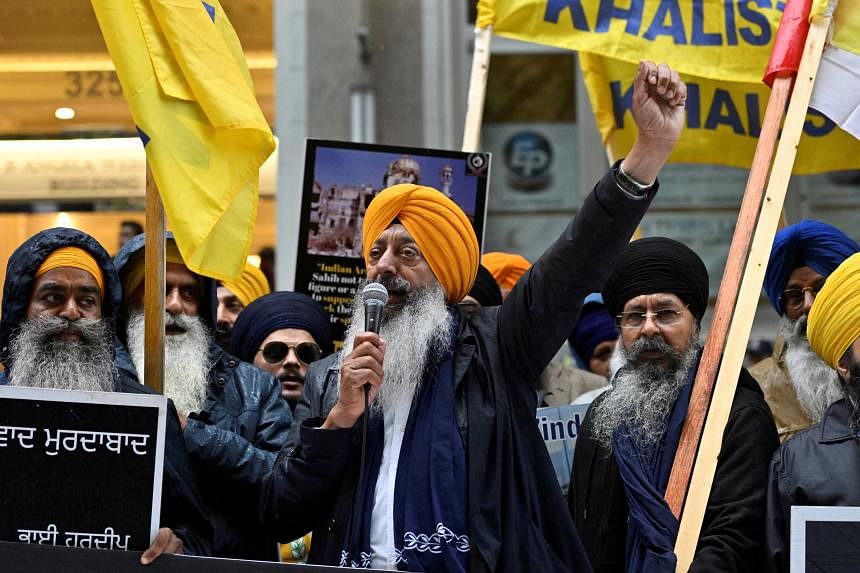WASHINGTON – Canada and India have fundamental and irreconcilable differences over free speech, yet Canada should understand India’s security concerns over advocates of Khalistan separatism who are active in the country, said Georgetown University professor Christine Fair.
The comment by Professor Fair, who is a South Asia expert at the Peace and Security Studies Programme of the university’s Edmund A. Walsh School of Foreign Service, came during a discussion on The Straits Times’ latest Asian Insider podcast.
She was joined by Mr Terry Milewski, the Canada-based author of the 2021 book Blood For Blood: Fifty Years Of The Global Khalistan Project.
Relations between India and Canada have plunged since Canadian Prime Minister Justin Trudeau in September said there were “credible allegations” that in June, Indian agents killed Sikh separatist Hardeep Singh Nijjar in Canada.
Gunmen killed Mr Nijjar in the carpark of the Guru Nanak Sikh Gurdwara in Surrey, British Columbia.
Mr Nijjar was an advocate for Sikh separatism, and a wanted man in India as the leader of a militant group called Khalistan Tiger Force.
Khalistan is the proposed Sikh homeland that separatists want carved out of the Indian state of Punjab.
The campaign for Khalistan in the 1970s and 1980s was very bloody, killing thousands of innocents and leaving a generation of Sikhs traumatised.
In the aftermath of the killing in June, Canada expelled an Indian diplomat and India, which denied allegations that its agents were behind the assassination, expelled a Canadian diplomat in retaliation.
But it did not stop there.
Last Friday, Canada withdrew a further 41 of its diplomats from India, reportedly after New Delhi threatened to strip them of their diplomatic immunity.
Canada is home to the largest community of Sikhs outside of India – an estimated 780,000.
India has long been annoyed that militant separatists like Mr Nijjar are tolerated in Canada, keeping alive the cause of a separate Khalistan state – and calling for a referendum on Khalistan, for instance – which has demonstrably little or no support in the wider Sikh community, either in Canada or in India’s Punjab state.
Critics say Mr Trudeau’s lack of action against the separatists is about vote bank politics.
Sikhs make up a little over 2 per cent of Canada’s population. In British Columbia, Sikhs comprise around 6 per cent of the province’s population. In Surrey, where Mr Nijjar was killed, Sikhs make up 27.4 per cent of the population.
“From India’s point of view, and I can completely understand this, they don’t see how you can have a peaceful call for a Khalistan referendum,” Prof Fair said.
“How can the destruction of the Indian state be peaceful? But the reality of Western speech protections is that, in fact, that speech is protected.”
Still, the West is going to have to “figure out a way to accommodate India’s legitimate security concerns because we expect India to accommodate ours”, she said.
New Delhi is especially sensitive to failures in symmetry and reciprocity, Prof Fair noted.
“Delhi is expected to jump through our (the West’s) hoops, but when Delhi asks us to jump through some of their hoops, and we decline to do so, there is a lot of resentment generated. And so I think that we have to find ways of being much more vigilant and taking on these Indian requests.”
The Canada-India relationship has been “kind of a dialogue of the deaf for 40 years”, Mr Milewski said.
“Indian politicians are banging the table saying, ‘How can you allow this kind of propaganda? Why don’t you crack down, lock them up?’ And the Canadians say, ‘Look, it’s freedom of speech.’ And so then the argument becomes, where exactly do you draw the line?
“In the UK, since the Terror Act of 2006, you cannot glorify terrorism, that’s an offence. But in Canada, we don’t have such legislation. So you can.”
Meanwhile, Mr Milewski warned: “The Khalistanis have been winning the information war because the West generally has been sitting back and letting it happen.
“We haven’t been pushing back. We’ve allowed... a whole generation in Canada, in the Sikh diaspora, to grow up believing that Sikhs want an independent state.”
He added: “They haven’t been to Punjab. They haven’t noticed basic facts, like, for example, in the last election (in Punjab), the only separatist party running got something like 2.5 per cent of the vote and no seats.”


